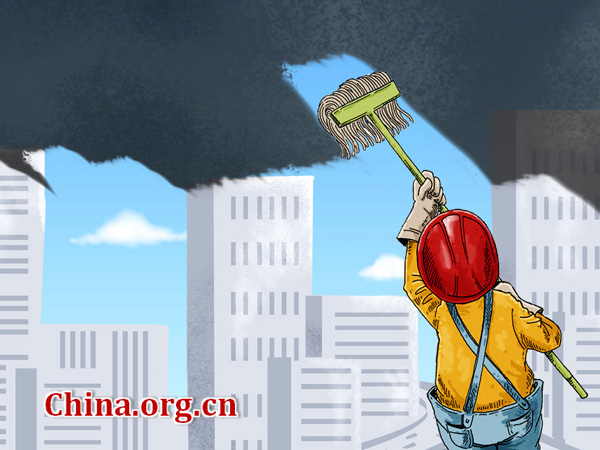Ecoliteracy might save the planet
- By Wan Lixin
 0 Comment(s)
0 Comment(s) Print
Print E-mail Shanghai Daily, August 8, 2014
E-mail Shanghai Daily, August 8, 2014
|
[By Zhai Haijun/China.org.cn] |
We saw an unusually cool July this year. There were altogether five days when the high temperature exceeded 35 degrees Celsius, compared with 25 in July last year.
But such is human forgetfulness that I have only a very vague impression of the heat spell last year. I seem to have regained some of my reflective power this week, with the temperature edging steadily higher and the smog returning. We are known as homo sapiens, the rational beings, but at least in our attitude toward our environment I do not see this quality much in evidence.
Smog is still heavy, but such is our attention span that few of us view it as more than a minor inconvenience. For politicians and policymakers worldwide, choking smog is much less a cause for alarm than an unexpected dip in US GDP.
New research shows that, as a result of global warming, smog may become a cause of illness and death around the world, with some scientists predicting that over half of the population of the Earth could be affected by a rise in the frequency and duration of polluted air. On July 30, Anders Levermann wrote on this page (“Antarctic ice collapse shows need for quick action”) that “the planet has entered a new era of irreversible consequences from climate change.” The only question now, he asked, is whether we will do enough to prevent similar developments elsewhere.
In their “Ecoliterate: How Educators Are Cultivating Emotional, Social, and Ecological Intelligence,” authors Daniel Goleman, Lisa Bennett and Zenobia Barlow advocate engaging with your communities and with environmental causes in confronting ever-increasing threats to clean air, water and land. According to them, “ecoliteracy” is a form of collective intelligence and community action. It depends on “empathy,” “making the invisible visible, anticipating consequences and recognizing your relationship to nature.”
Becoming “ecoliterate” enables us to deal with environmental challenges.
According to a study in 2009 by Sweden’s Stockholm Environment Institute, in several vital categories for human survival, among them “biodiversity, the nitrogen cycle” and “climate change,” human society has already passed the “safe boundary,” though humanity still has time to make changes.







Go to Forum >>0 Comment(s)